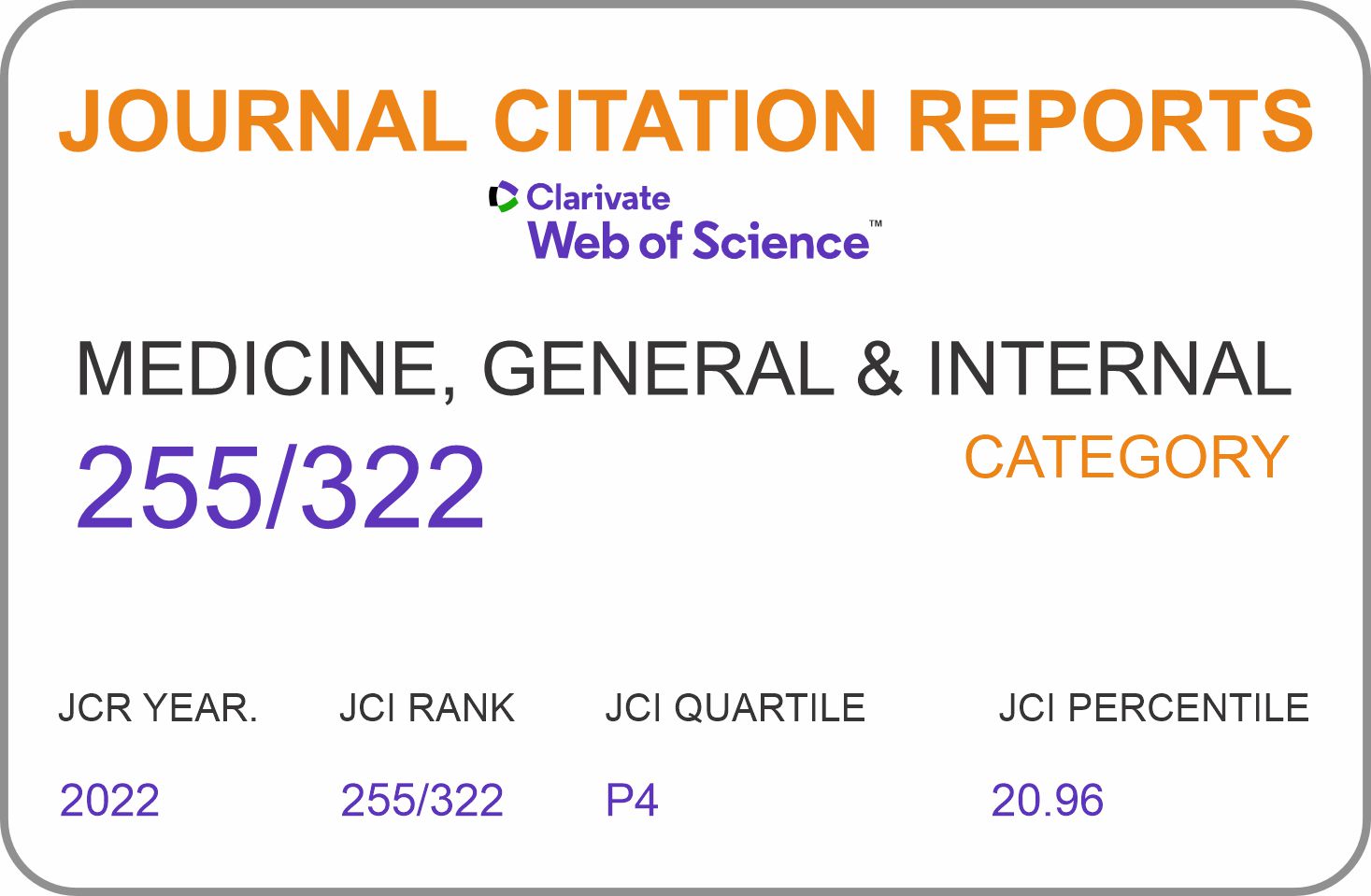Sociofamily risk and cognitive impairment in elderly adults treated at the Geriatric Center of the Peruvian Air Force in the period 2017-2020
DOI:
https://doi.org/10.35434/rcmhnaaa.2023.163.1918Keywords:
elderly, cognitive Impairment, social vulnerabilityAbstract
Introduction: Older adults constitute those over 65 according to the WHO. Likewise, sociofamily risk and cognitive impairment have been related in patients from the geriatric center of the Peruvian air force in the period 2017-2020. Objectives: To determine the association between socio-family risk and cognitive impairment in patients treated at the HFAP geriatric center in the period 2017-2020. Methodology: Primary, observational, analytical, cross sectional, retrospective study carried out in patients treated at the geriatric center of the HFAP in the period 2017-2020. Results: 121 older adults were evaluated, with an average age of 84 years. 23.1% presented social risk, 41.3% presented cognitive deterioration. 30.6% had type 2 diabetes mellitus and 13.2% Parkinson's disease. No significant association was found between socio-familial risk (p=0.851) and suffering from cognitive impairment. Suffering from type 2 diabetes mellitus (p=0.022) was associated with cognitive impairment. Conclusions: No association was found between socio-familial risk and cognitive impairment. It is necessary to carry out more studies in larger and more varied populations to evaluate risk factors for the development of cognitive impairment and other pathologies that affect the elderly in our country.
Downloads
Metrics
References
United Nations, Department of Economic and Social Affairs, Population Division (2015). World Population Ageing 2015 (ST/ESA/SER.A/390).
Instituto Nacional de Estadística e Informática. Encuesta Nacional de Hogares-Situación de la población adulta [internet] setiembre 2023 disponible en: https://m.inei.gob.pe/media/MenuRecursivo/boletines/03-informe-tecnico-adulto-mayor-ii-trimestre-2023.pdf
Angel Julio Romero Cabrera et al. Evaluación geriátrica hospitalaria: una herramienta necesaria. Medisur [revista en Internet]. 2018 [citado 2020 Ene 10]; 16(5):[aprox. 22 p.]. Disponible en: http://medisur.sld.cu/index.php/medisur/article/view/4009
Fu C, Li Z, Mao Z. Association between Social Activities and Cognitive Function among the Elderly in China: A Cross-Sectional Study. International Journal of Environmental Research and Public Health [Internet]. jan 2018 doi: 10.3390/ijerph15020231.
Shankar A, Hamer M, McMunn A, Steptoe A. Social isolation and loneliness: Relationships with cognitive function during 4 years of follow-up in the English longitudinal study of ageing. Psychosom Med [Internet]. 2013;75(2):161–70. Disponible en: http://dx.doi.org/10.1097/psy.0b013e31827f09cd
Gonzáles L, Marín A. Deterioro Cognitivo en adultos mayores Costa Rica: situación y factores de riesgo en centros diurnos. Revista Hispanoamericana de Ciencias de la Salud (RHCS). 2016;2(4):288–93.
Instituto Nacional de Salud Mental Honorio Delgado - Hideyo Noguchi" [Internet]. [citado 5 de octubre de 2020]. Disponible en: http://www.insm.gob.pe/investigacion/estud ios.htm
D.Cabrera González et al. Evaluación de la fiabilidad y validez de una escala de valoración social en el anciano. Atención Primaria.1999;23 páginas 434-440,
Luis Varela-Pinedo et al. Perfil clínico, funcional y sociofamiliar del adulto mayor de la comunidad en un distrito de Lima-Perú. Rev Perú Med Exp Salud Pública 2015:32(04):709-16.
Benavides-Caro CA. Deterioro cognitivo en el adulto mayor. Rev Mex Anestesiol. 2017;40(2):107-12.
Cardona AS, Duque MG, Arango DC, Cardona AS. Riesgo de deterioro cognitivo en personas mayores de las subregiones de Antioquia, Colombia. Rev. bras. Estud. Popul [Internet] 2016; 33 (3): 613-28. Disponible en:https://doi.org/10.20947/S0102-30982016c0008
De León-Arcila R. Factores de riesgo para deterioro cognitivo y funcional en el adulto mayor. Rev Med Inst Mex Seguro Soc.
King MV, Cáceres JAG, Abdulkadir MS. Prevalencia de depresión y factores de riesgo asociados a deterioro cognitivo en adultos mayores. Rev Cuba Med Gen Integral. 2017;33(4):1-15.
Zepeda CR, Espinoza ML, Araneda BC, Fuentes JC, Prado MM, Pedreros ST. Factores de riesgo sociodemográficos y mórbidos asociados a deterioro cognitivo leve en adultos mayores. Cuad Neuropsicol Panam J Neuropsychol [Internet]. 2021;15. Disponible en: http://dx.doi.org/10.7714/CNPS/15.2.204
López ÁG, Calero MD. Predictores del deterioro cognitivo en ancianos. Rev Esp Geriatría Gerontol. Rev Esp Geriatr Gerontol. 2009;44(4):220–224
Zacková L, Jáni M, Brázdil M, Nikolova YS, Marečková K. Cognitive impairment and depression: Meta-analysis of structural magnetic resonance imaging studies. NeuroImage Clin [Internet]. 2021;32(102830):102830. Disponible en: http://dx.doi.org/10.1016/j.nicl.2021.102830
Lyu F, Wu D, Wei C, Wu A. Vascular cognitive impairment and dementia in type 2 diabetes mellitus: An overview. Life Sci [Internet]. 2020;254(117771):117771. Disponible en: http://dx.doi.org/10.1016/j.lfs.2020.117771
Langa KM, Levine DA. The diagnosis and management of mild cognitive impairment: A clinical review. JAMA [Internet]. 2014;312(23):2551. Disponible en: http://dx.doi.org/10.1001/jama.2014.13806
Kalaria RN, Akinyemi R, Ihara M. Stroke injury, cognitive impairment and vascular dementia. Biochim Biophys Acta Mol Basis Dis [Internet]. 2016;1862(5):915–25. Disponible en: http://dx.doi.org/10.1016/j.bbadis.2016.01.015
Tariq S, Barber PA. Dementia risk and prevention by targeting modifiable vascular risk factors. J Neurochem [Internet]. 2018;144(5):565–81. Disponible en: http://dx.doi.org/10.1111/jnc.14132
Cancino M, Rehbein L. Factores de riesgo y precursores del Deterioro Cognitivo Leve (DCL): Una mirada sinóptica. Ter Psicol [Internet]. 2016;34(3):183–9. Disponible en: http://dx.doi.org/10.4067/s0718-48082016000300002
Karssemeijer EGA, Aaronson JA, Bossers WJ, Smits T, Olde Rikkert MGM, Kessels RPC. Positive effects of combined cognitive and physical exercise training on cognitive function in older adults with mild cognitive impairment or dementia: A meta-analysis. Ageing Res Rev. 2017 Nov;40:75-83.doi: 10.1016/j.arr.2017.09.003. Epub 2017 Sep 12.
Demurtas J, Schoene D, Torbahn G, Marengoni A, Grande G, Zou L, et al. Physical activity and exercise in mild cognitive impairment and dementia: An umbrella review of intervention and observational studies. J Am Med Dir Assoc [Internet]. 2020;21(10):1415-1422.e6. Disponible en: http://dx.doi.org/10.1016/j.jamda.2020.08.031
Dominguez LJ, Veronese N, Vernuccio L, Catanese G, Inzerillo F, Salemi G, et al. Nutrition, physical activity, and other lifestyle factors in the prevention of cognitive decline and dementia. Nutrients [Internet]. 2021;13(11):4080. Disponible en: http://dx.doi.org/10.3390/nu1311408
Downloads
Published
How to Cite
Issue
Section
Categories
License
Copyright (c) 2023 Mimmy Minerva De Jesús Begazo Bedoya, Nathaly Calderón Jaramillo, Fernando Runzer-Colmenares, Ian Falvy-Bockos

This work is licensed under a Creative Commons Attribution 4.0 International License.















